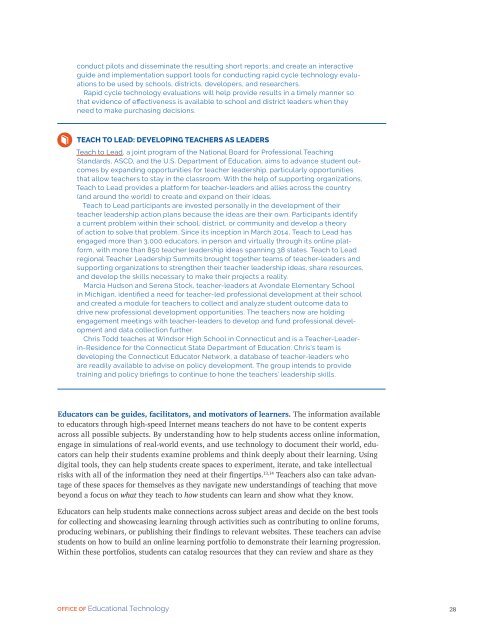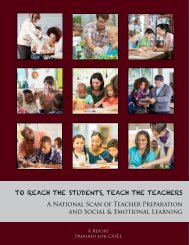Future Ready Learning
7m3sdJ
7m3sdJ
Create successful ePaper yourself
Turn your PDF publications into a flip-book with our unique Google optimized e-Paper software.
conduct pilots and disseminate the resulting short reports; and create an interactive<br />
guide and implementation support tools for conducting rapid cycle technology evaluations<br />
to be used by schools, districts, developers, and researchers.<br />
Rapid cycle technology evaluations will help provide results in a timely manner so<br />
that evidence of effectiveness is available to school and district leaders when they<br />
need to make purchasing decisions.<br />
TEACH TO LEAD: DEVELOPING TEACHERS AS LEADERS<br />
Teach to Lead, a joint program of the National Board for Professional Teaching<br />
Standards, ASCD, and the U.S. Department of Education, aims to advance student outcomes<br />
by expanding opportunities for teacher leadership, particularly opportunities<br />
that allow teachers to stay in the classroom. With the help of supporting organizations,<br />
Teach to Lead provides a platform for teacher-leaders and allies across the country<br />
(and around the world) to create and expand on their ideas.<br />
Teach to Lead participants are invested personally in the development of their<br />
teacher leadership action plans because the ideas are their own. Participants identify<br />
a current problem within their school, district, or community and develop a theory<br />
of action to solve that problem. Since its inception in March 2014, Teach to Lead has<br />
engaged more than 3,000 educators, in person and virtually through its online platform,<br />
with more than 850 teacher leadership ideas spanning 38 states. Teach to Lead<br />
regional Teacher Leadership Summits brought together teams of teacher-leaders and<br />
supporting organizations to strengthen their teacher leadership ideas, share resources,<br />
and develop the skills necessary to make their projects a reality.<br />
Marcia Hudson and Serena Stock, teacher-leaders at Avondale Elementary School<br />
in Michigan, identified a need for teacher-led professional development at their school<br />
and created a module for teachers to collect and analyze student outcome data to<br />
drive new professional development opportunities. The teachers now are holding<br />
engagement meetings with teacher-leaders to develop and fund professional development<br />
and data collection further.<br />
Chris Todd teaches at Windsor High School in Connecticut and is a Teacher-Leaderin-Residence<br />
for the Connecticut State Department of Education. Chris’s team is<br />
developing the Connecticut Educator Network, a database of teacher-leaders who<br />
are readily available to advise on policy development. The group intends to provide<br />
training and policy briefings to continue to hone the teachers’ leadership skills.<br />
Educators can be guides, facilitators, and motivators of learners. The information available<br />
to educators through high-speed Internet means teachers do not have to be content experts<br />
across all possible subjects. By understanding how to help students access online information,<br />
engage in simulations of real-world events, and use technology to document their world, educators<br />
can help their students examine problems and think deeply about their learning. Using<br />
digital tools, they can help students create spaces to experiment, iterate, and take intellectual<br />
risks with all of the information they need at their fingertips. 13,14 Teachers also can take advantage<br />
of these spaces for themselves as they navigate new understandings of teaching that move<br />
beyond a focus on what they teach to how students can learn and show what they know.<br />
Educators can help students make connections across subject areas and decide on the best tools<br />
for collecting and showcasing learning through activities such as contributing to online forums,<br />
producing webinars, or publishing their findings to relevant websites. These teachers can advise<br />
students on how to build an online learning portfolio to demonstrate their learning progression.<br />
Within these portfolios, students can catalog resources that they can review and share as they<br />
OFFICE OF Educational Technology<br />
28



